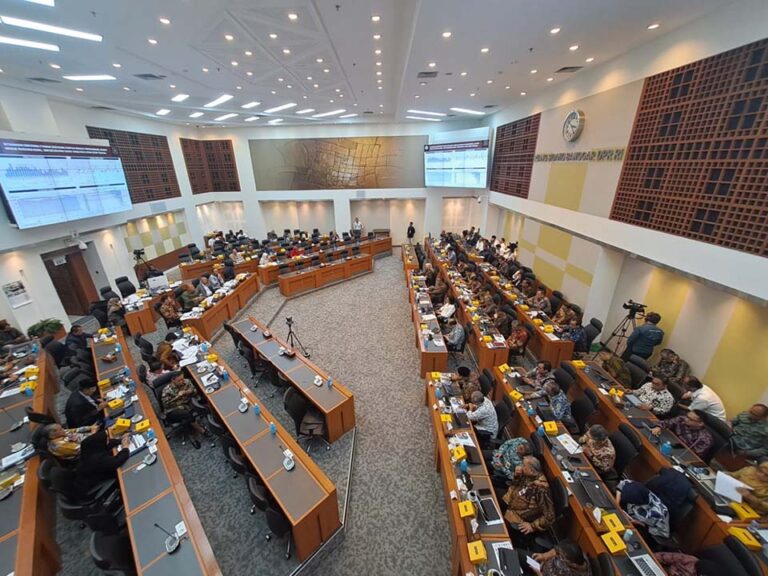July 10, 2024
Jakarta – The central government’s fiscal deficit this year is expected to be much larger than planned as the government is set to spend more and collect less tax than set out in this year’s budget.
Finance Minister Sri Mulyani Indrawati said on Monday the fiscal deficit is expected to reach 2.7 percent of gross domestic product (GDP), significantly higher than the 2.29 percent figure outlined in the 2024 national budget plan.
Speaking at the House of Representatives Budget Committee, Sri Mulyani said the wider fiscal deficit projection was due to “adjustments in state revenue” and “positive growth in state expenditure”.
In his presentation, Sri Mulyani detailed that latest forecasts showed tax revenues this year would reach only 96% of the target, but stressed that nominal figures would still show an annual increase of 2.9%, indicating a “secure national economy.”
Shortly before, she had revealed the government was struggling to collect taxes for the first half of 2024 as “falling commodity prices” hit business profits.
Overall tax revenue in the first half of the year was down 7% compared to the same period last year, with corporate tax plummeting 34.5% compared to the same period last year.
Mining collections saw the largest decline, down 58.4 percent year-on-year, followed by manufacturing, which saw a 15.4 percent decrease year-on-year.
Meanwhile, state spending is projected to exceed the budget by about 2.6 percent, or 87.1 trillion rupiah ($5.36 billion), with spending on central government ministries and agencies expected to be nearly 10 percent higher than planned.
Sri Mulyani said factors behind the increased spending included the construction of the new capital in Nusantara, social assistance and funding for local elections.
“The same goes for spending. [energy] Subsidies and compensation are [greater] roll, [lower rupiah] Exchange rate and [higher] “Prices are going up,” Sri Mulyani said.
Also read: Nusantara construction work halted for Independence Day events
Domestic oil and gas production is expected to fall short of targets this year, forcing the country to import more commodities and boosting spending.
The rupiah is expected to average around 16,000 to the dollar this year, well below the 15,000 rupiah assumption set in the national budget, meaning the country will have to spend more in rupiah to pay for imported oil and gas in US dollars.
The minister also noted that the government spent 155.7 trillion rupiah in subsidies and compensation to state-owned energy companies in the first half of the year, mainly on fuel and electricity, and that more spending would be needed on these items in the second half.
Despite the deficit now expected to reach Rp609.7 trillion instead of the Rp522.8 trillion indicated in the proposed 2024 budget, Finance Minister Sri Mulyani vowed not to rely heavily on government bonds to cover the deficit in order to keep “bond yields competitive”.
The current high global interest rate environment has made bond financing costly, but the government has another source of funding – unspent funds from previous budgets.
With the help of these funds, Sri Mulyani aims to issue Rp214 trillion less in bonds than the Rp666.4 trillion planned in the original budget.
The minister requested that an additional 100 trillion rupiah be taken out of unused budget funds for this year’s financing, and the House of Representatives Budget Committee approved this on Tuesday.
“The government is trying to protect the economy,” said Wijayanth Samirin, an economist at Paramadina University. The Jakarta Post The finance minister said on Monday that the slump in tax revenues was due to “low GDP growth” in 2023, which has led to lower corporate tax revenues this year.
He also said tax revenues were expected to be lower this year due to “unexpected GDP growth in 2024,” claiming that first-quarter growth was boosted to 5.11 percent mainly by the Ramadan festive season, general elections and increased social assistance.
“In fact, what is more worrying is the medium- and long-term trajectory. Premature deindustrialization is [tax] Contribution from manufacturing industry. […] Meanwhile, manufacturing and the formal sector are our main sources of tax revenue,” Wijayanto said.
“So, [cause] “Our revenue problems are not cyclical, they are actually very structural. Combine this with increased state spending over the next few years, including social assistance, Nusantara and debt repayments, and our problems are complete,” he added.
Also read: High debt shrinks Prabowo government’s fiscal space
Bima Yudhisthira Adinegara, Executive Director of the Centre for Economic Law, said: post He said on Monday that the possibility of a ballooning budget deficit was a “warning” for President-elect Prabowo Subianto, whose policies are perceived by many as expansionary but have not yet been factored into the calculations.
“Our state budget is [hardly in great shape]Therefore, there is a need to streamline programs, including the budget allocation of Rp 71 trillion for free school meals. [program]; it can probably be reduced. [The new capital city plan] “Budget rationalisation is also required to safeguard fiscal credibility,” Bhima said.


